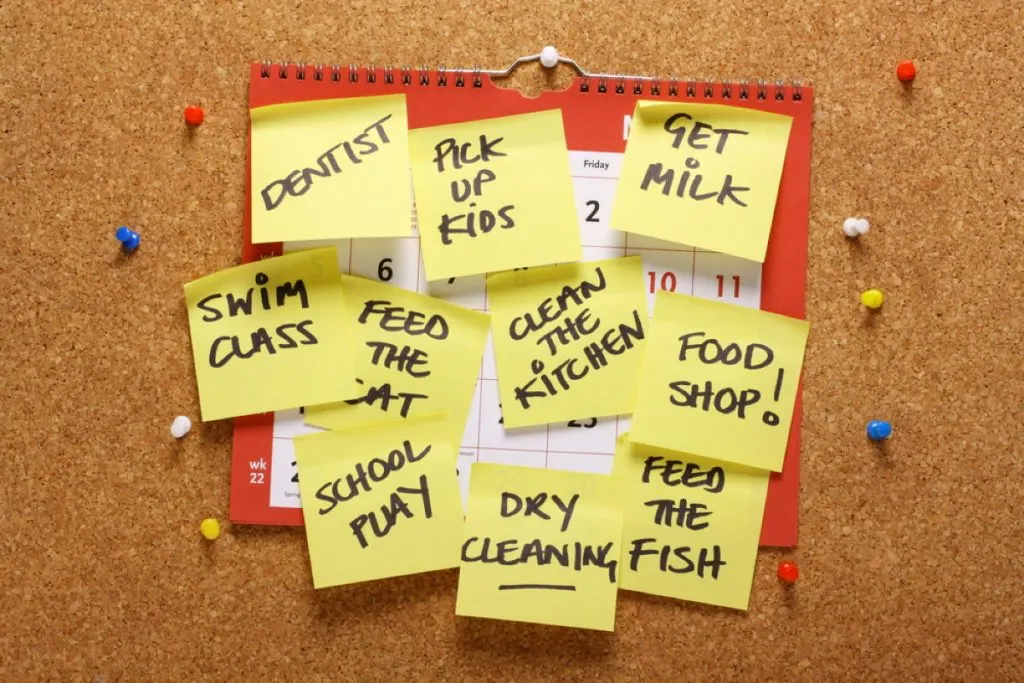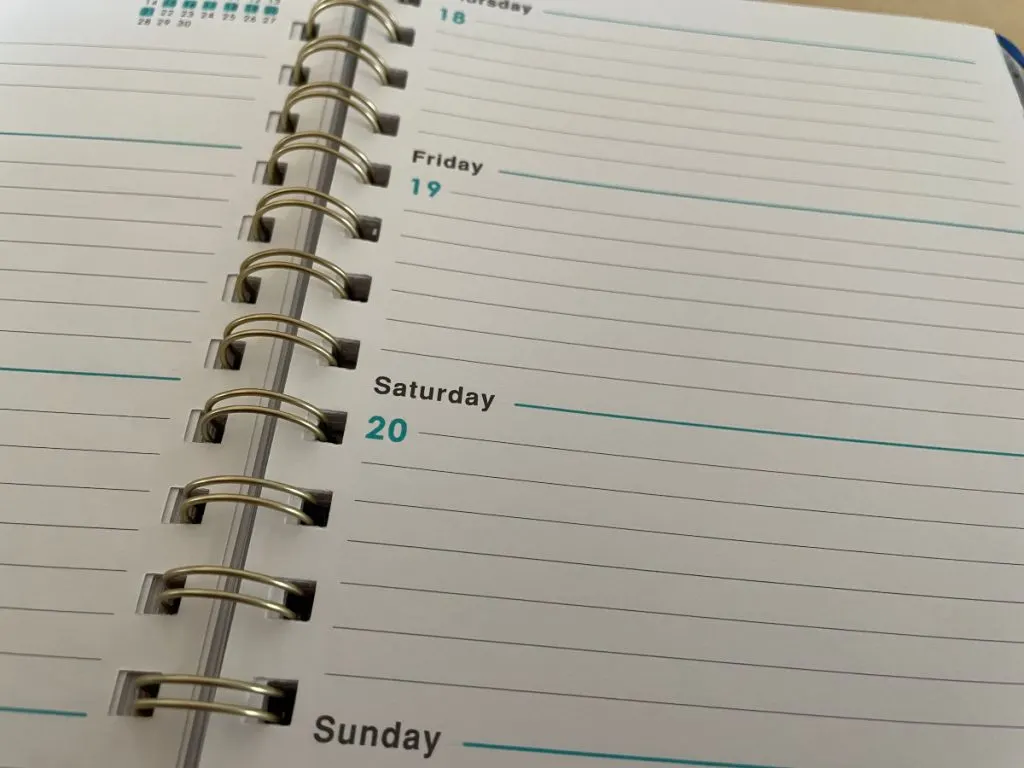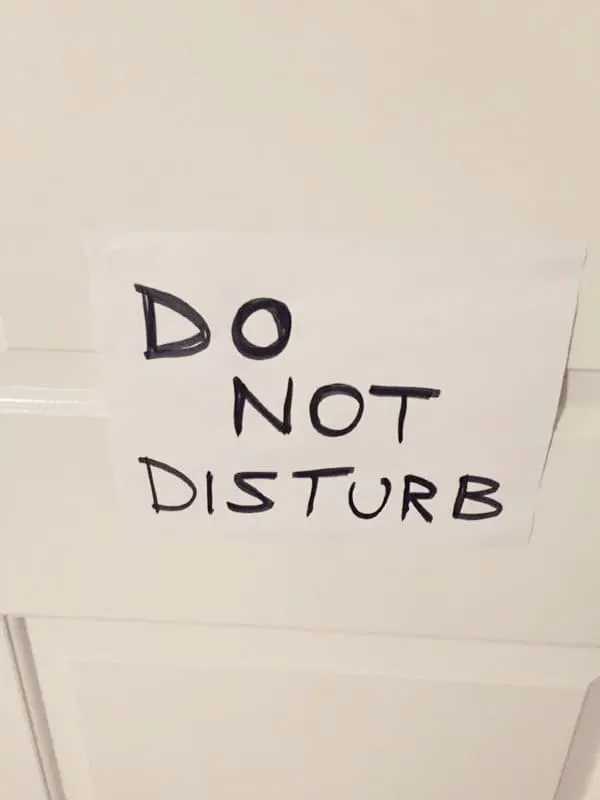Our family has a tendency to commit a lot and get very busy. It’s usually due to good things and in many ways we have felt very blessed, but it can also be exhausting. After years of struggling to find a way to both embrace our busy lives and get the restorative time we need, I have come up with some tricks to build in balance. I wanted to share those tricks with you, as well as some thoughts on the inevitable back-sliding and how to handle it.

How I Realized that Building in Balance Was Needed
A few years ago, when my kids were about 7 and 9, our family was totally maxed out. Between sports, music lessons, volunteer commitments, family obligations, and more, my family got to a point where we were cramming in too much. As we got more and more busy, I realized that my boys were getting increasingly cranky and whiny and that I, in turn, was getting grumpier with them.
The highest tension points happened when I was trying to work, while the boys were home. There were moments when I thought to myself, “why are they being so difficult?! Don’t they understand that I have work to do?!” And then I (finally) realized that their whining and bickering was because they wanted and needed attention from me. They were begging for it.
I decided that I needed to make a change so that I could honor their needs, and also my own. So, I decided to focus on building balance into our daily lives.
I made a commitment to myself that when they were at school, I would focus on work. No personal phone calls, emails, social media, laundry, cleaning, errands, etc. And when they were home, I would focus on being more present for them and also do some of the home-related chores that needed to get done (laundry, cooking, etc.).
No surprise: it worked like a charm. The whining and fighting decreased but, more importantly, I was less cranky with them. I no longer resented their interruptions and was able to be much more flexible and present. And that’s when I realized how much I believed in building in balance.
Building Balance in to Daily Life
As someone who has worked from home for over 14 years, I can tell you that the times when I am most productive and satisfied are when I protect my work time and don’t allow other tasks to seep in. But whether you work from home or not, I have come to believe that effectively setting boundaries is one of the keys to building in balance.
As we juggle many obligations—professional, familial, and communal—creating times and spaces in which we can focus our attention on fulfilling one obligation at a time can be incredibly helpful and much more efficient.
Work-life balance, I find, doesn’t just naturally happen; it requires some sort of structure. Here are some tricks that I have found to be helpful for me:

Create a plan
After years of trying different planning approaches, I finally found a simple, two-pronged approach that works really well for me.
The first is my weekly plan. I created a ritual on Monday mornings where I sit down and write out both work and life to-do lists for the week. I then look at my calendar and schedule the different major tasks (leaving lots of pockets of extra time for when things inevitably take longer than I expect them to). This helps me to feel like I have a clear path for all that needs to get done over the course of the week, alleviates the swirl in my head about all that I need to do.
The second piece is creating my daily plan. Each morning, I write up my day’s to-do list on a post-it note. I do it on a post-it note because the small amount of space helps to keep me from getting too ambitious about what I can accomplish in a day. It both reigns me in and helps me to feel satisfied and accomplished by the end of the day (I looooove crossing things off a list).
Perhaps this approach will work for you, perhaps not. The point, though, is to take the time to figure out an system that helps you to feel both in control at the start of the day and accomplished by the end of it. I have found that doing this makes it much easier to let go of the overwhelm and be more present.

Take temptation away
If you are someone who, like me, is tempted to “quickly” do something else instead of focusing on the task at hand, I would encourage you to take steps to actively remove the temptation.
If checking your email or social media is a pull that’s hard to resist, there are some things you can do to reduce the distraction. One option is to turn all social media and email notifications off, so that your phone doesn’t ping you all the time. You can either do this for each individual app or you can just set your phone to do not disturb for the times when you really need to focus.
And if you want to take it a step further, one thing I did that made a huge impact on my focus was removing social media apps from my phone. Now, if I want to check my personal accounts on my phone, I have to actively log in.
The other kind of distraction that I find hard to resist is the desire to take care of tasks from other parts of my life. Starting a load of laundry during work time, for example, seems like a quick task, but the reality is that it takes up attention and interrupts your work time. Similarly, shooting off one “quick” email for work while making dinner means that your focus is not on the task at hand, which risks messing up your cooking flow or even leaving something to burn in the pan (she says, speaking from experience).
For these sorts of distractions, the best solution I have found is to schedule time for the tasks that nag at me, so that my brain knows that they will get done and I can let them go for now. Other than that, I think it’s really about just catching and stopping yourself when temptation strikes.

Turn chores into family time
While I am all for separating work time from family time, I believe that household tasks and chores provide a great opportunity for family together time.
Folding laundry, making dinner, cleaning the house. Try to find ways to turn these tasks into fun family time. Maybe it’s playing fun music so you can all dance to while you clean up. Perhaps it’s finding cooking tasks for everyone so you spend time in the kitchen together. By turning these activities into fun family times, not only do you get more quality time, but you also have extra hands and everything gets done faster!

Learn to say “no”
If you are someone, like me, who takes on more than you can realistically (and happily!) do, then learn to say “no.”
When we overextend ourselves, we end up doing everyone a disservice because either we burn out or we can’t fulfill all of the obligations we have taken on. If saying “no” is too hard, a good first step is trying to say “not now.”

Learn to say “yes”
If someone offers help that you could really use, accept it graciously. It’s OK not to do it all ourselves!

Don’t forget yourself
If you wan to fulfill your obligations, self-care is essential. Think about it: how are you more efficient – when you are exhausted, hungry, and feeling blah or when you are well-rested, calm, and happy? Carving out time for things that will refill your emotional and physical reserves is important.
I know that when you are trying to simplify, the idea of adding in something else feels crazy (and maybe even self-indulgent), I get it because I’m that way, too. But what I’ve come to realize is that these acts of self-care don’t have to be a huge time commitment. Try to find at least 15 minutes each day that can be all yours. It could be reading a book for fun, doing a short exercise routine, or hiding in your closet to each chocolate without having to share. The point is that it is an activity that you choose to do for you.

How to Handle Back-Slides and Build Balance Back In
Even when we have the best of systems, there are times when life gets away from us. In those moments of overwhelm, it is easy to feel like we’ve failed, but we that’s not the case! Life just happens that way. So, instead, I find it is helpful to slow down and return to the basics.
I start by sitting down and writing out a master list. What are the work obligations? Which life tasks are looming on the horizon?
Then I reassess the list.
- What are the essential items and what are the things that can slide for a while?
- Could I simplify in some way?
- Are there items on the lists that someone else can do?
What I have found time and again is that when I am overwhelmed I have a tendency to think that everything is essential, but by slowing down, writing out the list, and reassessing I am able to see that certain items can be released, at least for a little while.
Once I’ve got my list of must-dos, then I work to put it all in the calendar. I ask for and accept help. I recruit my kids and partner to step up and pitch in more. And I make sure there is at least one small thing in each day for me.
And finally, I remind myself that this crazy time is a phase and things will slow down eventually.
Do you have ways of building in balance that have helped to calm things? I’d LOVE to hear about them in the comments. And if you are looking for a way to ease the burden of making dinner, our family-friendly meal plans can help to simplify the dinnertime scramble.
